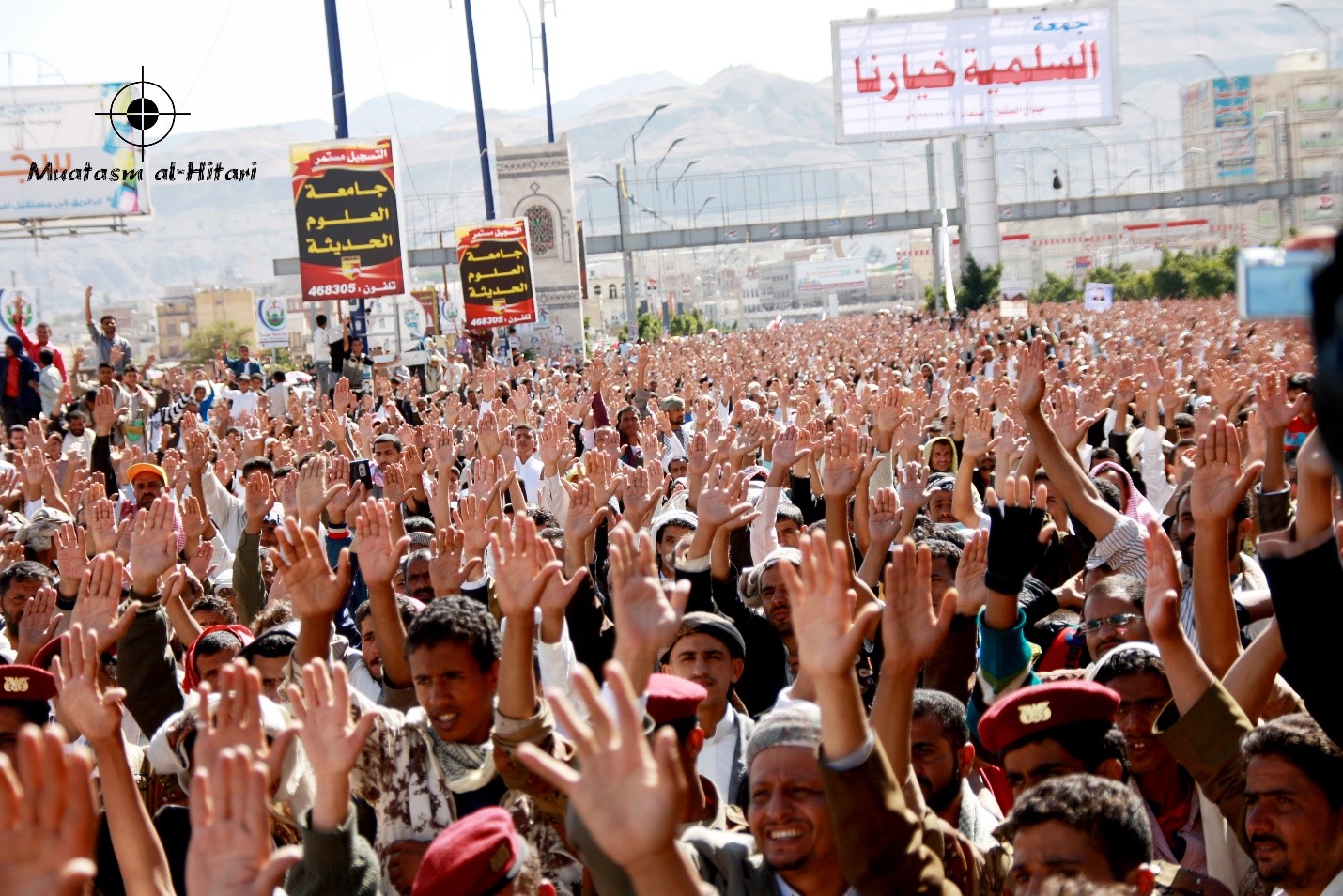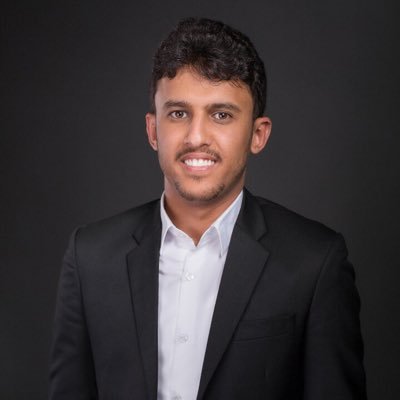بعد سوريا، أصبح اليمن أحد أخطر البلدان للصحافيين. فبعد احتجاجات العام 2011 وإسقاط الرئيس علي عبد الله صالح، سيطر متمرّدو الحوثي على مدينة صنعاء في 21 أيلول/سبتمبر 2014، وأصبح الخطر المحدق بالصحافيين والإعلام أكبر من أي وقت مضى. واستهدفت المجموعة المتمرّدة واعتقلت معظم الصحافيين الذين عارضوها. وأصبحت التهديدات بالقتل والهجمات الجسدية والاعتقالات والخطف، إضافة إلى القيود على الحرية، أموراً شائعة . كذلك تعرضت العديد من قنوات التلفزة المحلية والدولية للمداهمة. ونتيجة لكل ذلك بالكاد تجد في اليمن في الوقت الراهن أي صحافي دولي.
قصتي لا تختلف عن قصص الكثير من الصحافيين المحليين سواء كانوا يمنيين أم سوريين أم عراقيين. جميعنا نتشارك المهنة نفسها في بلدان تمزّقها الحروب. كصحافي ومصوّر محلي مستقل، أغطّي الحرب اليمنية المستمرة في صنعاء ومأرب وتعز والحديدة لصالح العديد من القنوات التلفزيونية مثل "بي بي سي" والجزيرة. وغالباً ما أركّز في عملي على الأخبار لا سيّما من زاوية إنسانية. وعلى الرغم من التحديات المستمرة، لعبت عوامل شديدة الخطورة ولا تزال دوراً مركزياً في طريقة ممارستي للصحافة لا بل أعادت تشكيلها.
ولعلّ أحد أصعب المواقف التي نواجهها في اليمن هو الانتقال من محافظة إلى أخرى. وللوصول إلى قصتك الصحافية، غالباً ما تضطر لتعريض نفسك للخطر. فصحيح أن اضطرارك لعبور الحواجز يمنحك وضوحاً في الرؤية ولكنّه يهدد سلامتك في النهاية بأكثر من معنى. ففي اليمن أنشأت الميليشيات معظم الحواجز وتسيطر عليها. وتعتقل تلك المجموعات المسلحة بشكل منهجي الصحافيين الذين يعارضون أفكارها، كوسيلة لفرض رقابة عليهم.
توجهت إلى صنعاء في صباح أحد الأيام لتغطية الظروف الحياتية للناس الذين يعاني معظمهم من مطالب الاحتلال. قبل منتصف النهار كنت متّجهاً مشياً نحو البيت حاملاً معدّاتي، ومررت بمجموعة مسلّحين تابعين للحوثي. فأوقفوني وبدأوا إرهاقي بالأسئلة وتخلل ذلك صراخ بين الحين والآخر من أحد الرجال. "ماذا تصوّر؟ أرنا آخر صورة التقطتها! أطفئ الكاميرا ولا تلمسها!" فعلت كل ما طلبوه منّي.
في لحظة معيّنة، أمروني بأن أصعد في سيارة قائلين إنّهم سيأخذونني إلى مركز الشرطة. استمرّت العدوانية بلا هوادة: "أنت خائن! أنت تعمل لصالح الجزيرة أو العربية. من الأفضل لك أن تعترف بذلك!". فالعمل مع وسائل إعلام كهذه يعتبر عملياً جريمة بالنسبة للحوثيين والمجموعات المتمردة التي تدعمهم. ويعود ذلك إلى أن هذه الوسائل تغطّي حرب اليمن بشكل نقدي لا سيّما ما يتعلّق بالحوثيين. لذلك فإنهم بطبيعة الحال سوف يتّهمون وسائل الإعلام هذه بأنها مؤيدة للسعودية نظراً إلى أنها جزء من التحالف الذي يقاتل في اليمن بقيادة المملكة. وبالطبع نفيت أي علاقة بهاتين القناتين أو أن أكون صوّرت أي شيء بشكل غير قانوني. ولكن غني عن القول إن كل جهودي لردعهم عن الإمساك بي باءت بالفشل.
وصلنا إلى مركز الشرطة حيث صادر مسؤول من المجموعة نفسها معداتي وبطاقتي الصحافية. وهناك استأنفوا تهديدي. وأدركت سريعاً أن المسألة المطروحة هي ما إذا كنت خائناً أم لا. ومن أجل بتّ المسألة، عليهم التحقق من الكاميرا للاطلّاع على الصور ومقاطع الفيديو و"عرضها على خبير لمراجعتها" بحسب تعبيرهم.
وسط تكتيكات الترهيب والاتهامات، سمحوا لي بالمغادرة ولكنّهم حجزوا معدّاتي. ومرت ثلاثة أيام من دون أن أتمكّن من استعادتها ومن دون أن تصلني أية أخبار عن عملية المراجعة المزعومة. وأخيراً، اتصلوا بي وأعادوا لي الكاميرا بحجة أني لم أرتكب أي خطأ، طبعاً وفقاً لمعاييرهم التقديرية. ولكن الحقيقة أنهم لم يستطيعوا تشغيل الكاميرا للتحقق من محتواها لأنّهم ببساطة لا يعرفون استخدام الكاميرات. كان ذلك من حسن حظي وهو أمر للأسف لا ينطبق على الكثير من الصحافيين الذين يقبعون في السجون ومصيرهم لا يزال مجهولاً.
لا تنتهي قصص الحرب التي يمكن روايتها والتي تعكس الثمن الذي يدفعه الصحافي في اليمن اليوم. ومن هذه القصص مثلاً حين كان التحالف العربي يصف المقر الرئاسي حيث كان الرئيس المخلوع علي عبد الله صالح، ذهبت مع مجموعة صحافيين ومصوّرين لتغطية الحدث. حصل ذلك في المراحل الأولى من عملية التحالف. سمح لجميع الصحافيين بالدخول إلى المنزل بعد تفتيش دقيق ومصادرة بطاقاتهم الصحافية ومعداتهم وهواتفهم الخلوية. يومها تركوا لنا فقط كاميراتنا وبطاقة ذاكرة واحدة لكل منها.
غطّينا الحدث وجلنا حول المقر المستهدف للرئيس المخلوع. التقطت جميع الصور التي احتجت إليها ولكنّ مشاعر الخوف والقلق من أن يستأنف القصف لم تبارحني قطّ. وبدأت أتحدث إلى زملائي محاولاً إقناعهم بخطورة البقاء وقتاً إضافياً في ذلك المكان ولكنّي لم أفلح. فقررت المغادرة بصحبة أحد أصدقائي بينما بقي العديد من الصحافيين والمصورين في الداخل. ولم تمر سوى لحظات حتى بدأت الطائرات تحوم فوق القصر قبل أن تقصفه. وبالنتيجة أصيب العديد من زملائي الصحافيين.
الحرب لا تترك أحداً من شرّها ومع ذلك، كصحافي يمكنك أن تقوم بخطوات لتكون في أوضاع أقل خطورة لا سيما إذا كنت صحافياً مستقلاً إذ إنك ستواجه تحديات أكثر من زملائك الذين يعملون بدوام كامل في مؤسسات إعلامية كبيرة.
غالباً ما لا يحصل الصحافيون العاملون لحسابهم الخاص على التدريب على كيفية تغطية الظروف الخطرة. وعادة لا تتوفّر لديهم الوسائل للحصول على معدات حماية مثل السترة الواقية من الرصاص وخوذة الرأس، كما أنه ليس لديهم تأمين صحّي. وعادة لا يمكنهم الاعتماد على أي شبكة دعم على عكس الصحافيين المدعومين من وسيلة إعلامية. ومن تداعيات ذلك مثلاً عدم وجود فريق قانوني يساعدهم في حال تعرّضوا للتوقيف أو الاعتقال وغياب طاقم عمل داعم في حال الحاجة إلى رد مباشر على وضع خطير.
ومن الواضح أن هذه الظروف تضع الصحافيين المستقلّين في أوضاع غير مواتية فيما يتعلق بسلامتهم. ولكنها أيضاً تهدد عملية توثيق انتهاكات حقوق الإنسان وجرائم الحرب في مناطق النزاع. هذا ما حصل في اليمن وسوريا حيث هناك نقاط في مناطق الحرب لا يخبر العالم عمّا يحصل فيها سوى الصحافيين المحليّين أو الناشطين الإعلاميين المحليين المعروفين أيضاً بالمواطنين الصحافيين. وجميع هؤلاء يعملون لحسابهم الخاص. فكيف سيعرف العالم إذا قتلوا أو تمّ إسكاتهم؟
للأسف ثمة ممارسة سائدة بين بعض الشبكات الإعلامية تقوم على توظيف صحافيين مستقلين محلّيين خلال النزاعات ومن ثمّ التخلّي عنهم بعد أن تحصل الشبكة على المعلومات التي تحتاجها. قبل سنوات، انضممت إلى مجموعة تُعنى بالدفاع عن حقوق الصحافيين هي "مؤسسة الحرية" Freedom Foundation. تهدف المؤسسة إلى وقف هذه الأنواع من الممارسات الاستغلالية بحق الصحافيين ودعوة المؤسسات الإعلامية إلى حماية حقوق الصحافيين المستقلّين. من بين الأمور التي قمنا بها كان توثيق حالات انتهاكات حقوق الإنسان بحق الصحافيين اليمنيين. وفي الواقع كنّا ننشر سنوياً تقريراً يستعرض هذه الانتهاكات أملاً منّا بتوجيه رسالة إلى العالم بأن يتحرّك في هذا الاتجاه. كنّا أيضاً نساعد الصحافيين في العثور على محامين (للحصول على مساعدة قانونية) ونتابع قضايا فرديّة ونجري تدريبات على المهارات الإعلامية التقليدية. كما كنّا ننظم، حين يتاح لنا ذلك، ورش عمل للصحافيين لمساعدتهم على تطوير وعيهم حيال سلامتهم. وبالفعل بدأ عملنا يحقق تقدّماً ولكنّه توقف حين سيطر الحوثيون على صنعاء.
كصحافي مستقل، ثمة إجراءات يجب اتخاذها لتحسين شروط سلامتك أثناء تغطية نزاع ما. إليك بعض النصائح التي أستوحيها من تجربتي الخاصة في تغطية الحرب الأهلية اليمنية:
-
سلامتك الشخصية أهم من أي خبر أو صورة.
-
حين تسيطر مجموعة مسلحة على مدينة تتواجد فيها، خبّئ معدات التصوير دائماً.
-
تفاد الذهاب إلى مناطق مستهدفة وانتظر ساعتين على الأقل بعد توقف القصف قبل التوجّه إلى الموقع لتغطية التداعيات.
-
حين تسمع هدير طائرات، غادر على الفور وراقب ما الذي يحصل عن بعد.
-
إذا كان القصف قريباً من موقعك، غادر المكان في أسرع وقت ممكن. فكّر في أن أي طائرة أطلقت للتوّ صواريخ لن تتمكّن من إعادة الكرّة على الفور فهي تحتاج إلى عشر دقائق على الأقل لتستأنف القصف. لذلك يكون لديك بعض الهامش للفرار.
-
إذا كان القصف يستهدف موقعك، لا تركض. تمدد على الأرض واحتمِ.
-
إذا تعرّضت للاعتقال على يد مجموعة مسلّحة، استسلم دائماً وافعل ما يطلبونه منك. حاول أن تهدئ الأمور.
-
بالإضافة إلى التدريب على العمل في مناطق النزاع، تدرّب على الإسعافات الأولية قبل التوجّه إلى الميدان.
-
دائماً ارتد ملابس واقية للصدر واعتمر خوذة أثناء تصوير اشتباكات مسلّحة.
-
القاعدة الذهبية هي أن تحرص على البقاء بعيداً عن المواجهات المسلحة المباشرة.
مصادر ومراجع:
-
قتل منذ العام 2010 في اليمن، 19 صحافياً (تم التأكّد من دوافع مقتل 17 منهم) و3 من العاملين في الحقل الإعلامي. وفي الأعوام 2011 و2015 و2016 و2017، ظهر اسم اليمن على لائحة لجنة حماية الصحافيين للدول الأخطر على حياة الصحافيين. الرابط من لجنة حماية الصحافيين" تم الاطّلاع عليه في 11 تموز/يوليو 2017: https://www.cpj.org/killed/mideast/yemen
-
تقرير من نقابة الصحافيين اليمنيين وثّق أكثر من 100 هجوم على صحافيين ومؤسسات إعلامية في النصف الأول من العام 2016. "اليمن: نقابة الصحافيين ترصد أكثر من 100 انتهاك لحرية الصحافة" Yemen: YJS reports more than 100 press freedom violations، الاتحاد الدولي للصحافيين، 2016. تمّ الاطلاع على الرابط في 11 تموز/يوليو 2017: http://www.ifj.org/nc/news-single-view/backpid/1/article/yemeni-journalists-syndicate-launches-its-6months-report-and-observed-100-cases-of-violation-in-the/
-
"يأس في شوارع اليمن وسط الحرب والفقر" Desperation on Yemen's streets amid war and poverty، "بي بي سي"، 27 حزيران/يونيو 2015. تمّ الاطلاع على الرابط في 11 تموز/يوليو 2017:http://www.bbc.com/news/av/world-middle-east-33297659/desperation-on-yemen-s-streets-amid-war-and-poverty
-
"التحالف العربي" يشير إلى التحالف العسكري بقيادة السعودية الذي ينفذ هجمات في اليمن ضد المتمردين الحوثيين ودعماً للحكومة اليمنية. وتضمّ الدول الداعمة البحرين والكويت وقطر (خرجت لاحقا) والإمارات العربية المتحدة ومصر والأردن والمغرب والسودان. والدول الأخرى التي اعتبر تقرير للأمم المتحدة أنها على ارتباط بالتحالف هي الولايات المتحدة والمملكة المتحدة وفرنسا وماليزيا. أنظر: http://www.reuters.com/article/us-yemen-security-un-idUSKBN15D0SB
-
قصفت طائرات من التحالف بقيادة السعودية منزل علي عبد الله صالح في العاصمة صنعاء غير أن الرئيس السابق نجا. ويتّهم صالح الذي تنحّى في العام 2012 بعد عام من التظاهرات الدموية التي عمّت البلاد ضد حكمه الذي دام ثلاثة عقود بالوقوف إلى جانب الحوثيين الذين أسقطوا الرئيس عبد ربه منصور هادي في العام 2015. "التحالف يقصف منزل الرئيس اليمني السابق صالح" Coalition bombs ex-Yemen president Saleh's residence، الجزيرة، 10 أيار/مايو 2015. تمّ الاطلاع على الرابط في 11 تموز/يوليو 2017: http://www.aljazeera.com/news/2015/05/cloneofstrikes-yemen-saada-breach-international--150510035539400.html
-
"مؤسسة الحرية"، فيسبوك. تمّ الاطلاع على الرابط في 11 تموز/يوليو 2017: https://www.facebook.com/FreedomFoundationYemen/
-
فخري العرشي، "مؤسسة الحرية تعرب عن القلق على سلامة الصحافيين اليمنيين بعد مقتل سومرز" Freedom Foundation Expresses Its Concern on the Safety of Yemeni Journalists after Somers Killing، "ناشونال يمن" National Yemen. تمّ الاطلاع على الرابط في 11 تموز/يوليو 2017: https://nationalyemen.com/2014/12/07/freedom-foundation-expresses-its-concern-on-the-safety-of-yemeni-journalists-after-somers-killing/
-
"مؤسسة الحرية تعلن تقريرها الأول والثاني (المرصد الإعلامي) حول الانتهاكات المرتكبة في اليمن خلال سبتمبر وأكتوبر 2014 Freedom Foundation Announces First and Second (Media Observatory) Reports of Violations Committed by Yemen During September and October 2014، "الشبكة العربية لمعلومات حقوق الإنسان". تمّ الاطلاع على الرابط في 11 تموز/يوليو 2017: http://anhri.net/?p=137548&lang=en
-
"اليمن"، "فريدوم هاوس"، 2014، تمّ الاطلاع على الرابط في 11 تموز/يوليو 2017 https://freedomhouse.org/report/freedom-press/2014/yemen
"كيف سيطر المتمردون الحوثيون على العاصمة اليمنية صنعاء" How Yemen's capital Sanaa was seized by Houthi rebels، "بي بي سي"، 27 أيلول/سبتمبر 2014. تمّ الاطلاع على الرابط في 11 تموز/يوليو 2017: http://www.bbc.com/news/world-29380668








































